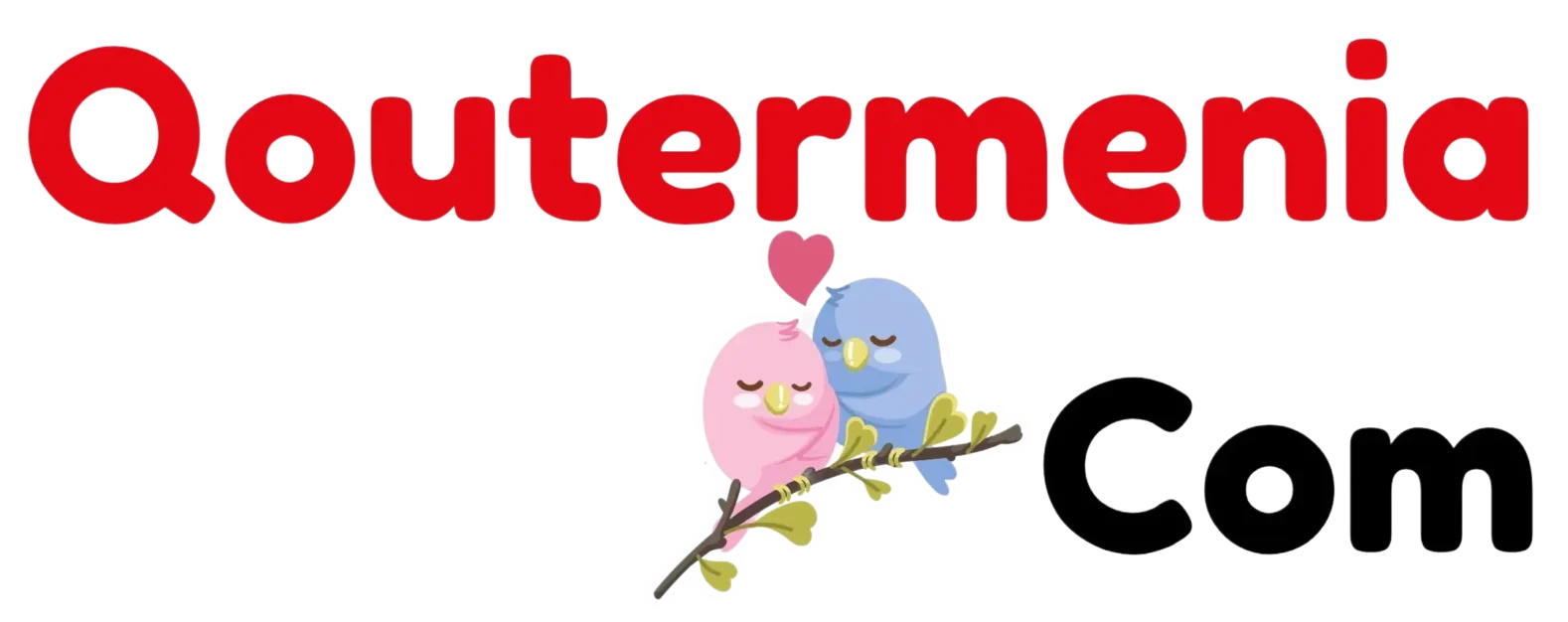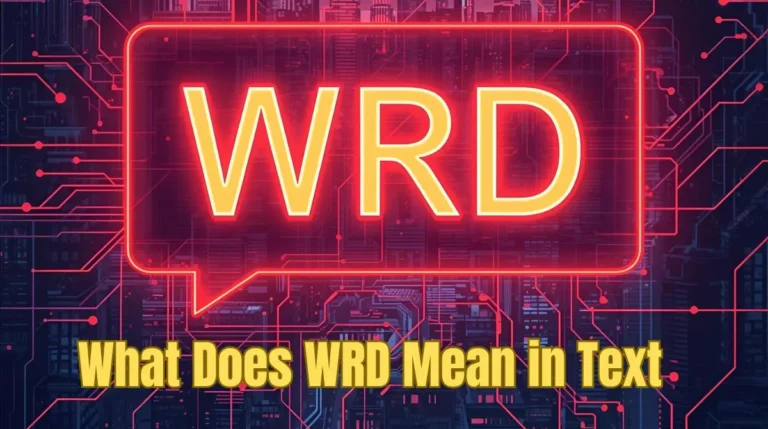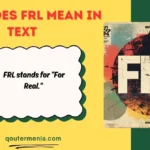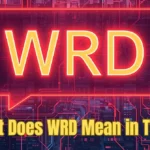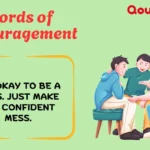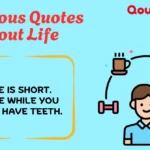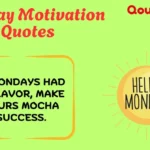If you’ve come across “WRD” in a text or social media chat and found yourself confused, you’re not alone.
Abbreviations and slang terms have taken over digital communication, often leaving many wondering what they actually mean.
So, what does WRD mean in text? This short and catchy term is widely used in casual conversations, memes, and online communities, especially among younger generations.
It’s part of modern texting culture where speed and simplicity rule. Understanding what WRD stands for, how it’s used, and when to use it helps you sound more natural and in tune with online lingo.
Let’s dive deep into its meaning, usage, and nuances.
Definition & Meaning
WRD is a shortened form of the word “word” — a slang expression that means “I agree,” “true,” or “you’re right.” It’s used to acknowledge someone’s statement, much like saying “facts,” “real,” or “exactly.”
For example:
- Person A: “That movie was amazing.”
- Person B: “Wrd!”
Here, “WRD” signals agreement, similar to saying “You said it!” or “I know, right?”
While the literal meaning of word refers to a unit of language, its slang version has roots in African American Vernacular English (AAVE).
Over time, it became a mainstream expression meaning “I hear you” or “I respect that.”
Background & History
The slang “word” originated in the 1980s hip-hop culture, symbolizing truth, respect, and agreement. Artists and communities used it to validate someone’s statement, much like “That’s the truth.”
During the rise of texting and online communication in the 2000s, users started shortening phrases for convenience. Word turned into WRD — a faster, trendier form that caught on among teens and young adults.
Over platforms like AOL Messenger, Twitter, and Snapchat, it evolved into a cool, concise way of showing understanding. Its use spread globally, though it still carries traces of its cultural origins in hip-hop and street language.
Usage in Various Contexts
The meaning of WRD can vary depending on tone, context, and platform.
| Context | Meaning | Example |
|---|---|---|
| Casual Chat | Agreement or acknowledgment | “You’re right, wrd.” |
| Sarcastic Tone | Mild disbelief or teasing | “Oh, wrd? You finally finished it?” |
| Serious Conversation | Respect or empathy | “You’ve been through a lot, wrd.” |
| Social Media | Reaction to posts or memes | “Wrd, that’s relatable.” |
In essence, WRD can mean “I agree,” “for real,” or “you’re not lying.” Its tone depends on how it’s written and the situation.
Common Misconceptions & Clarifications
One common misunderstanding is thinking WRD stands for something else like an acronym. It doesn’t — it’s simply a slang abbreviation of “word.”
Another misconception is that it’s rude or dismissive. In reality, its tone depends on delivery. For example:
- “WRD.” (with a period) may sound blunt.
- “Wrd!!” (with exclamation marks) feels enthusiastic.
It’s also worth noting that WRD doesn’t carry the same weight in formal writing. Using it in emails, essays, or business chats can come across as unprofessional.
Similar Terms & Alternatives
Several expressions mirror the meaning of WRD, depending on region and platform.
| Slang Term | Meaning | When to Use |
|---|---|---|
| Facts | Total agreement | When emphasizing truth |
| Real talk | Honest statement | During serious discussions |
| No cap | “I’m not lying” | To stress sincerity |
| Bet | Agreement or confirmation | When agreeing to a plan |
| True that | Supportive agreement | Casual, friendly tone |
Each of these has its own vibe, but they all signal validation or agreement.
How to Respond to This Term
When someone texts WRD, your response should match the tone.
Here are some examples:
- Agreeing: “Yeah, wrd for real.”
- Curious: “Wrd? What happened?”
- Playful: “Haha, wrd. You always say that.”
- Supportive: “Wrd, I feel you on that.”
If you’re not sure what the person meant, it’s fine to ask — “What do you mean by wrd?” — especially in a new chat or cross-cultural exchange.
Regional or Cultural Differences
While WRD is common in the U.S., especially in urban slang, it’s not equally understood worldwide. In countries like the U.K. or Australia, some may interpret it literally as “word” rather than slang.
In online gaming or American pop culture spaces, though, WRD is universally recognized. It often reflects a laid-back, confident communication style.
Interestingly, in African American communities, saying “Word?” (with a question tone) means “Really?” — showing surprise or curiosity rather than agreement.
Comparison with Similar Terms
Let’s compare WRD with other trending terms:
| Term | Meaning | Tone | Usage Example |
|---|---|---|---|
| WRD | Agreement / truth | Neutral-casual | “Wrd, that’s Confused.” |
| Bet | Agreement / confirmation | Chill, assertive | “Bet, I’m in.” |
| No cap | Truth / honesty | Informal | “No cap, that was fun.” |
| Fr | Short for “for real” | Casual | “Fr, that’s facts.” |
| Say less | Agreement / understanding | Confident | “Say less, I got you.” |
This comparison shows that WRD sits comfortably in the middle — simple, respectful, and easy to use in most casual situations.
Usage in Online Communities & Dating Apps
On Snapchat, Instagram, or TikTok, WRD appears in comments, captions, and replies. It’s often used to validate someone’s opinion or emotion.
Example:
- “That quote hit hard.”
- “Wrd.”
On dating apps, it may show shared understanding or agreement. For instance:
- “I love late-night drives.”
- “Wrd, same here.”
It helps build rapport quickly, signaling relatability without saying much.
Hidden or Offensive Meanings
Unlike some internet slang, WRD is generally not offensive. It’s safe for casual use. However, the tone and punctuation can change its feel.
For example:
- “Wrd.” — can sound cold or dismissive.
- “Wrd lol” — adds humor and softens tone.
- “WRD??” — shows surprise or disbelief.
So, while harmless, it’s best used thoughtfully in context to avoid miscommunication.
Suitability for Professional Communication
In business or academic settings, WRD should be avoided. It’s too informal and might appear careless. Instead, use alternatives like:
- “I agree.”
- “That’s true.”
- “You’re right about that.”
Professional communication values clarity and respect, so slang like WRD belongs in private or social conversations, not workplace discussions.
FAQs
What does WRD stand for in text?
It’s a shorthand for “word,” meaning agreement or acknowledgment, similar to saying “true” or “I agree.”
Is WRD slang or an acronym?
WRD is slang, not an acronym. It’s a shortened version of “word” used in casual digital communication.
Can I use WRD in formal writing?
No. It’s best suited for informal texts or chats, not business or academic communication.
What does WRD mean on Snapchat?
On Snapchat, WRD expresses agreement or relatability, often used in replies like “Wrd, same here.”
Is WRD the same as “no cap”?
Not exactly. “No cap” means “no lie” or “for real,” while WRD means “I agree” or “true.”
Is WRD offensive or disrespectful?
Not at all. It’s friendly and casual, but context and tone determine how it’s received.
Conclusion
In a world of evolving online slang, WRD stands out as a versatile and simple expression of agreement or understanding.
From its hip-hop roots to its digital-age usage, it remains a symbol of authenticity and relatability.
Whether you’re chatting with friends, commenting online, or decoding memes, knowing what WRD means helps you stay connected with modern communication trends.
Just remember — while it’s perfect for casual talk, it doesn’t belong in professional spaces.

Emily Martin is the creative author at Qouter Menia, crafting heartfelt quotes and captions that beautifully express emotions.
